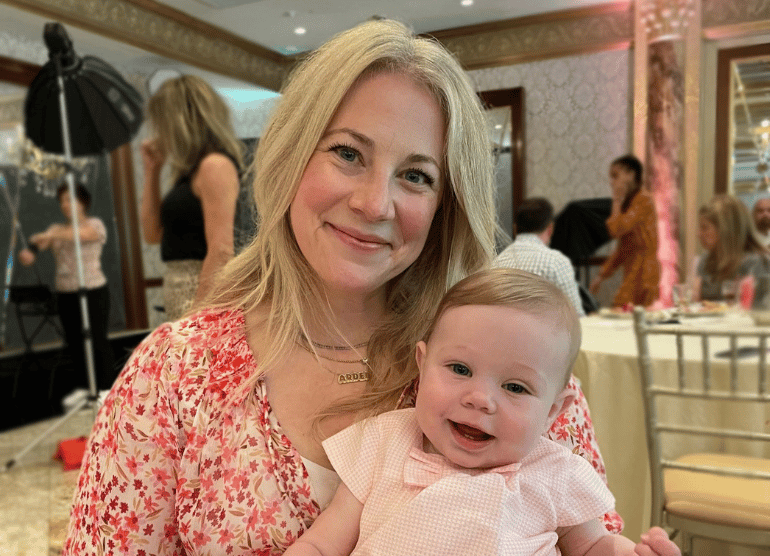Two years after a hospitalization due to Guillain Barre Syndrome (GBS), a rare neurological disorder in which the immune system attacks the nerves, Jill Marmo came to The Valley Hospital Fertility Center to discuss egg freezing.
“I had a friend use The Valley Hospital Fertility Center, so I was familiar with the location and had been treated at The Valley Hospital for my GBS where I received such special care,” the 43-year-old said. “I didn’t even think twice about making an appointment as it felt like a no-brainer.”
In 2019, the northern New Jersey native worked with Dehan Chen, MD, Associate Clinical Director of The Valley Hospital Fertility Center, to preserve her eggs (oocytes) through egg freezing.
Egg freezing, also known as egg harvesting, begins with stimulating the ovaries with fertility medications so multiple eggs mature during a single cycle. The egg retrieval process is performed under anesthesia where the patient is asleep and breathing on their own. The eggs are then evaluated by an embryologist and mature eggs are frozen and preserved. The frozen eggs are stored until the patient wishes to become pregnant, at which time they can be thawed, fertilized, and incubated for transfer.
 After the COVID-19 pandemic hit, Jill felt her life stopped in many ways and was uncertain how she wanted to proceed with her fertility journey.
After the COVID-19 pandemic hit, Jill felt her life stopped in many ways and was uncertain how she wanted to proceed with her fertility journey.
“I had just hit 40 and for women, there is a societal pressure surrounding age and one's ability to have a child, so the number 40 put a heavy weight on me,” said Jill. “As a single woman as well, I wondered if I was ready to pursue this avenue of being a single mother by choice. After speaking with my obstetrician and gynecologist, Melody Benham, MD, she gave me the confidence to start seriously thinking about motherhood. That summer, I contacted the fertility center again for a consult with Dr. Chen.”
In September 2021, Jill had her consult and went in for initial tests, which included a full blood workup; a saline sonogram, which is an ultrasound that uses sound waves and a computer to create images of the inside of the uterus; and due to her age, she was recommended to complete a mammogram. Unfortunately, Jill’s mammogram identified some concerns, and her fertility journey was once again placed on hold while she worked with a breast doctor.
During this break, Jill began to look for sperm donors. She also spoke with a psychologist, who provided information about the process, helpful tips, and resources to make the donor selection process easier to navigate.
“Once my donor was selected, the sperm was sent to the lab, and the process of making embryos started, using the eggs that I froze about two and a half years earlier,” said Jill. “Of the 15 eggs I initially froze, eight were fertilized, and only two matured. Those two went in for genetic testing and both were viable for a transfer.”
Jill completed her first natural transfer, a process of implanting an embryo during a woman’s regular ovulation cycle, in March 2022, but unfortunately, the transfer was unsuccessful. After consulting with Dr. Chen, a second transfer with her remaining embryo was scheduled in June, which was also unsuccessful.
“Dr. Chen assured me he had hope to get more eggs to create more embryos,” Jill said. “That summer I had three back-to-back egg retrievals. I also started to incorporate acupuncture at this time, as well as a totally modified diet and an increase in supplements.”
After the three retrievals, Jill was left with only one viable embryo to transfer. Jill asked her care team if they could perform a hysteroscopy, a procedure that allows a doctor to examine the inside of the uterus and cervix, to make sure there wasn’t anything that could prevent the embryo from implanting. Dr. Chen agreed, and the hysteroscopy revealed an infection. Jill began a medication to combat the infection, and her transfer was scheduled for January 27, 2023, with Keri Greenseid, MD.
“I found out I was pregnant on February 6,” said Jill. “The tears that fell and the joy I felt was immense. It felt like I beat the odds being a single mom, using a sperm donor, and aged 42.”
Jill had an easy pregnancy and was monitored by Valley’s Maternal-Fetal Medicine team, who specialize in the ongoing care of pregnant mothers and their unborn babies, particularly women with high-risk pregnancies. She was induced, and on October 12, 2023, her daughter Arden Johnna Marmo was born via cesarean section.
“I truly believe that Dr. Chen’s agreeing to do the hysteroscopy is what resulted in my successful pregnancy,” said Jill. “To have a doctor willing to come from a place of understanding and openness was such a gift. He always made me feel heard, and I will forever be grateful for that.”
“I have shared my experience with many women in the hopes that it will help redefine the myths that surround motherhood,” said Jill. “Your fertility does not end at 35, you do not need to be in a marriage or partnership to build a family, but you do need to have trust in your doctors, unending fortitude, and the courage to be your own advocate. Everyone at The Valley Hospital Fertility Center gave me my baby girl and made my dream of becoming a mom come true. It is the greatest gift I have ever been given.”
For more information about The Valley Hospital Fertility Center, please visit ValleyHealth.com/Fertility.

